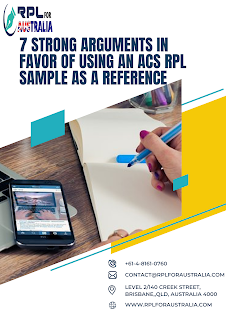Is It Tough To Complete The RPL ACS Australia Skill Assessment
Introduction
The journey to obtaining an Australian Computer Society (ACS) skills assessment through the Recognition of Prior Learning (RPL) pathway can be both exciting and daunting for IT professionals worldwide. In this blog, we'll delve into the challenges that candidates may face during the RPL ACS Australia skill assessment process and provide valuable insights and solutions to make this journey smoother.
Understanding the RPL ACS Australia Skill Assessment
The RPL Australia Computer Society skill assessment is a pathway for individuals who lack formal ICT qualifications but possess substantial work experience in the field. It allows candidates to demonstrate their skills and knowledge through a structured application process.
The Challenge of Documenting Your Experience
One of the primary challenges candidates encounter is documenting their extensive experience effectively. RPL applicants must provide detailed evidence of their work, including project reports, reference letters, and resumes. This process can be time-consuming and may require thorough documentation.
Solution: Start by organizing your work history, highlighting key projects, responsibilities, and achievements. Use the ACS guidelines to structure your RPL report correctly. Seek professional assistance if needed to ensure your documentation aligns with ACS standards.
Meeting ACS Criteria
ACS has strict criteria for assessing ICT qualifications. Candidates must align their experience with the relevant ACS skills framework, which can be complex and challenging.
Solution: Thoroughly review the ACS guidelines and identify the key areas where your experience matches their requirements. Seek guidance from experts who specialize in RPL Australian Computer Society skills assessment to ensure your application meets the criteria.
Writing the Career Episodes
RPL applicants are required to write Career Episodes that provide a detailed account of their work experience. Crafting these episodes in a way that showcases your skills and competencies can be a daunting task.
Solution: Focus on specific projects and challenges you've faced, highlighting how you addressed them. Use the STAR (Situation, Task, Action, Result) method to structure your Career Episodes, emphasizing your contributions and the impact of your work.
Language Proficiency
Effective communication and English language proficiency are crucial for success in the RPL ACS Australia skill assessment. Inadequate language skills can lead to misunderstandings and unsuccessful applications.
Solution: Improve your English language skills by taking language courses or tests like IELTS or PTE. Consider seeking professional editing services to ensure your RPL report is well-written and free of language errors.
Time and Patience
The entire RPL ACS Australia skill assessment process can be time-consuming, requiring candidates to gather documentation, write Career Episodes, and wait for assessment outcomes.
Solution: Plan your timeline carefully and allocate sufficient time for each step of the process. Be patient and stay motivated throughout the journey, as a successful outcome can open doors to exciting opportunities in Australia.
Conclusion
While the RPL ACS Australia skill assessment process may pose challenges, it is entirely manageable with the right approach and support. By organizing your documentation effectively, meeting ACS criteria, crafting compelling Career Episodes, improving your language proficiency, and maintaining patience, you can overcome these hurdles and set yourself on the path to a successful RPL ACS skill assessment. Remember that seeking guidance from experts in RPL for ACS can significantly enhance your chances of a positive assessment outcome, making your Australian dream a reality.


Comments
Post a Comment